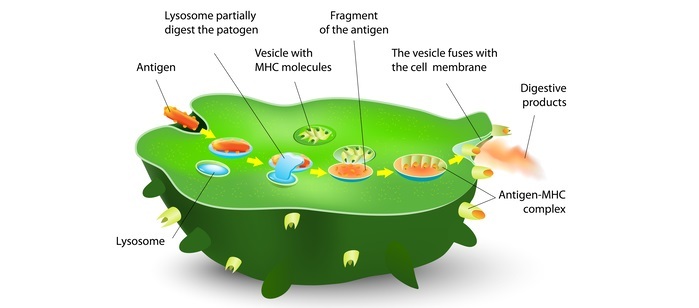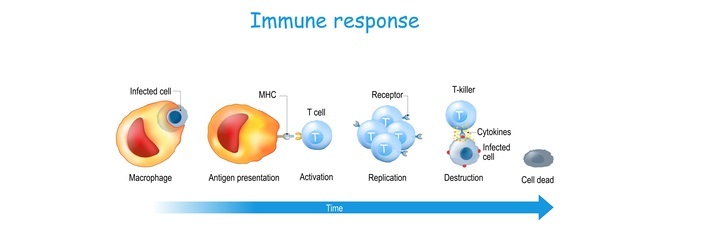
 Data Structure
Data Structure Networking
Networking RDBMS
RDBMS Operating System
Operating System Java
Java MS Excel
MS Excel iOS
iOS HTML
HTML CSS
CSS Android
Android Python
Python C Programming
C Programming C++
C++ C#
C# MongoDB
MongoDB MySQL
MySQL Javascript
Javascript PHP
PHP
- Selected Reading
- UPSC IAS Exams Notes
- Developer's Best Practices
- Questions and Answers
- Effective Resume Writing
- HR Interview Questions
- Computer Glossary
- Who is Who
Antigen Presentation: A Vital Immune Process
Introduction
The human immune system is an incredibly complex and powerful mechanism, capable of detecting and defending against a vast array of potential threats. At the heart of this system are specialized cells called T cells and B cells, which are capable of recognizing specific foreign molecules known as antigens.
Antigen presentation is a crucial process that allows these immune cells to recognize and respond to antigens. This article will explore the mechanisms of antigen presentation and its importance in the immune system's function.

What is Antigen Presentation?
Antigen presentation is the process by which specialized immune cells present antigens to T cells and B cells, triggering an immune response. Antigens can be a wide variety of molecules, including proteins, carbohydrates, lipids, and nucleic acids, and are often derived from invading pathogens such as bacteria, viruses, and parasites.
In some cases, antigens can also be self-molecules that have become altered or mutated in some way. The process of antigen presentation involves a complex interplay between different types of immune cells, including antigen-presenting cells (APCs) such as dendritic cells, macrophages, and B cells, and T cells, which play a central role in coordinating the immune response.
The overall goal of antigen presentation is to activate T cells and B cells, leading to the production of antibodies and the recruitment of other immune cells to eliminate the threat posed by the antigen.

Mechanisms of Antigen Presentation
Antigen presentation occurs in two main ways: via the major histocompatibility complex (MHC) class I pathway and the MHC class II pathway. Each pathway is responsible for presenting antigens to different types of T cells.
MHC Class I Pathway
The MHC class I pathway is responsible for presenting antigens to CD8+ T cells, also known as cytotoxic T cells. These T cells are responsible for killing infected cells and cells that have become cancerous or otherwise abnormal.
The MHC class I pathway is also involved in the regulation of the immune response by presenting self-antigens to T cells, ensuring that the immune system does not attack healthy cells.
The process of MHC class I antigen presentation begins when a cell becomes infected with a pathogen or undergoes some other form of cellular stress. The cell will then break down proteins from the pathogen or altered self-molecules into small fragments known as peptides.
These peptides are transported into the endoplasmic reticulum (ER), where they bind to MHC class I molecules. The MHC class I molecule-peptide complex is then transported to the cell surface, where it is presented to CD8+ T cells.
If the CD8+ T cell recognizes the presented antigen as foreign or abnormal, it will be activated and begin to divide rapidly, generating a large number of effector T cells that can target and kill infected or abnormal cells.
MHC Class II Pathway
The MHC class II pathway is responsible for presenting antigens to CD4+ T cells, also known as helper T cells. These T cells play a critical role in coordinating the immune response by releasing cytokines and activating other immune cells, such as B cells and cytotoxic T cells.
The process of MHC class II antigen presentation begins when an APC, such as a dendritic cell or macrophage, phagocytoses a pathogen or abnormal cell. The phagosome containing the pathogen is then fused with a lysosome, resulting in the degradation of the pathogen into small peptides. These peptides are then loaded onto MHC class II molecules in the lysosome and transported to the cell surface, where they are presented to CD4+ T cells.
If the CD4+ T cell recognizes the presented antigen as foreign or abnormal, it will become activated and begin to release cytokines, which can activate other immune cells and promote the production of antibodies.
The Importance of Antigen Presentation in Immune Function
Antigen presentation is a vital process in the immune system's function, as it allows the body to recognize and respond to a wide variety of potential threats.
Without antigen presentation, the immune system would not be able to distinguish between self and non-self-molecules, leading to autoimmune disorders or the failure to recognize and eliminate invading pathogens.
Antigen presentation also plays a crucial role in the development of immunological memory, which is the ability of the immune system to remember and quickly respond to previously encountered antigens.
This is why vaccines, which contain weakened or dead pathogens, are so effective in preventing disease.
By presenting these antigens to the immune system, vaccines stimulate the production of memory T cells and B cells, which can quickly respond to the pathogen if encountered again in the future.
In addition, antigen presentation is essential for cancer immunotherapy, which involves using the immune system to target and kill cancer cells.
Many types of cancer cells express abnormal or mutated proteins that can be recognized by the immune system as foreign antigens.
By presenting these antigens to T cells, cancer immunotherapy can activate an immune response that specifically targets and kills cancer cells while sparing healthy cells.

